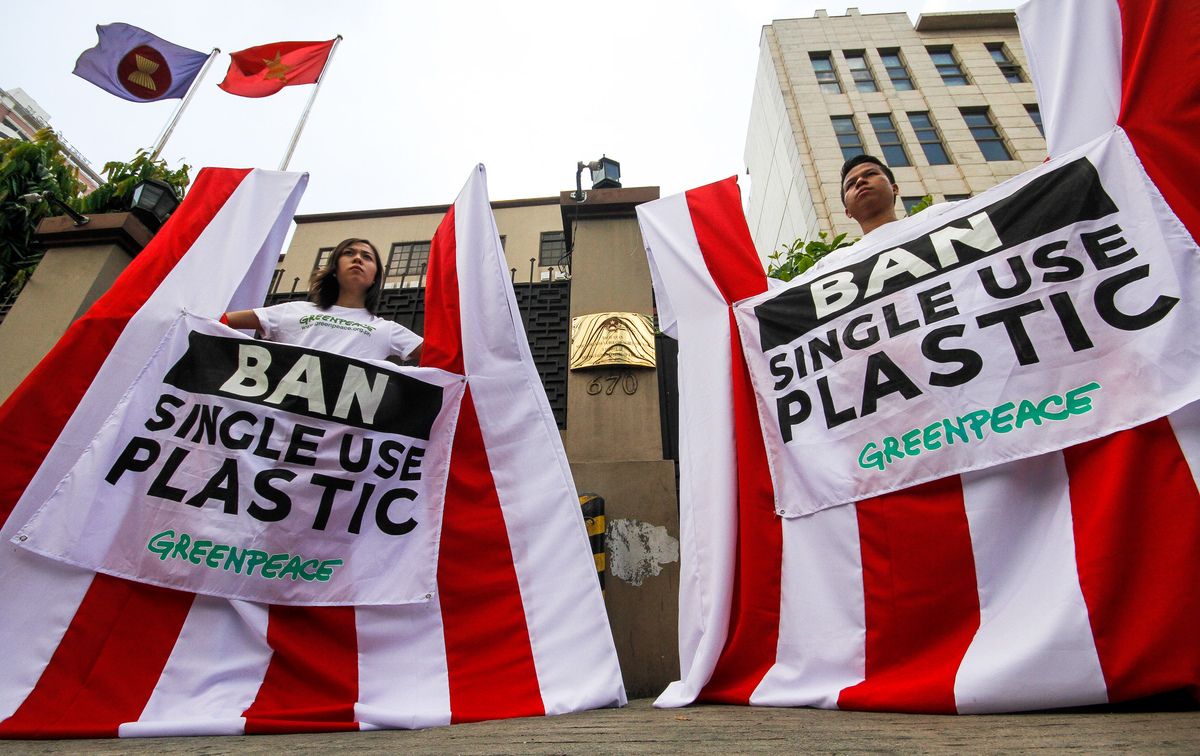Manila, Philippines – Acting on the urgency of the plastics pollution problem in the region, and with the upcoming Association of Southeast Asian Nation (ASEAN) Summit commencing in Manila, Greenpeace Southeast Asia brought its message to the ASEAN community by delivering a letter of appeal, brought by a giant animated ‘Plastic Bag Man and Woman’, to the respective embassies of Indonesia and Malaysia.
The letter of appeal urges the ASEAN member states to ban single-use plastics, and to unite and act to address plastics and marine debris pollution. Greenpeace is asking ASEAN governments to stiffen policies on waste management to arrest the rising rate of waste being dumped into the ocean and finding their way to the open seas.
Single-use plastic refers to bags, bottles, straws, and the likes, that are usually disposed after one-time use.
A 2015 study named five member states of the ASEAN as among the biggest sources of plastics pollution in the world’s oceans: Indonesia, the Philippines, Vietnam, Thailand, and Malaysia[1].
“The ASEAN region’s contribution to plastic pollution in the oceans cannot be ignored and is already way beyond alarming. We are asking the ASEAN membership to take this issue with a sense of urgency and demand that our leaders initiate bold steps to address plastics pollution through regional cooperation, exacting corporate responsibility and massive public education,” said Abigail Aguilar, Detox Campaigner of Greenpeace Philippines.
The failure of these waste management systems is one of the primary causes of plastic waste entering the oceans. This is compounded by additional factors, including lack of infrastructure, harmful human activities, an inadequate public understanding of the potential consequences of their actions, the lack of adequate legal and enforcement systems nationally and internationally, and a lack of financial resources[2].
The group is also calling for corporate responsibility, with the consumer goods sector cited as a primary user of plastics. The social and environmental impacts of their use of plastics have been quantified in their ‘natural capital cost’, which equates to a monetary value of US$75bn per year. The natural capital cost to marine ecosystems of plastic waste is US$13bn per year. In one study, only half of 100 companies assessed reported quantitative data on plastics. There is a multitude of opportunities for the corporate sector to take greater responsibility for the pollutants they create and identify methods to reduce the quantity of plastics used and increase recyclability of their products[3].

Greenpeace activists, dressed in giant mock plastic bags, hold up signs demanding an end to single use plastics in Southeast Asia in front of the Embassy of Vietnam in Manila. Plastic Pollution Activity at ASEAN Embassies in Manila. © Alanah Torralba / Greenpeace
“ASEAN needs to up its game and demand full disclosure of important information from corporations who profit from single-use plastics. Corporations need to take responsibility for their environmental impacts and seek to transform their practices to bring about a cleaner supply chain. This is an important step in reducing plastics wastes at source,” Aguilar added.
The oceans are already filled with 275 million tons of plastics. The cumulative quantity of plastic waste available to enter the ocean from land is predicted to increase by an order of magnitude by 2025. The Ellen Macarthur Foundation projects that plastics in the ocean will outweigh fish by 2050. Every year, 8 million metric tons of plastic currently arrive in our oceans which is equivalent to five grocery bags filled with plastic for every foot of coastline in the world[4].
“The amount of plastic debris in our oceans has already reached critical levels. The ASEAN needs to work together to set appropriate regulations and encourage businesses, communities, and consumers to take action,” Aguilar said.
Notes to the editors:
[1] Jambeck, Jenna R., Roland Geyer, Chris Wilcox, Theodore R. Siegler, Miriam Perryman, Anthony Andrady, Ramani Narayan, and Kara Lavender Law. “Plastic Waste Inputs from Land into the Ocean.” http://science.sciencemag.org/content/sci/347/6223/768.full.pdf?ijkey=BXtBaPzbQgagE&keytype=ref&siteid=sci
[2] United Nations Environment Programme “Marine Litter: A Global Challenge (April 2009). Available: http://www.unep.org/pdf/unep_marine_litter-a_global_challenge.pdf.
[3] UNEP (2014) Valuing Plastics: The Business Case for Measuring, Managing and Disclosing Plastic Use in the Consumer Goods Industry. http://plasticdisclosure.org/assets/files/Valuing_Plastic/Valuing_Plastic-Executive_Summary.pdf
[4] World Economy Forum “The New Plastics Economy – Rethinking the future of plastics”. Industry Agenda (2016). http://www3.weforum.org/docs/WEF_The_New_Plastics_Economy.pdf
For more information:
Abigail Aguilar, Detox Campaigner, Greenpeace Southeast Asia-Philippines
[email protected] | +63 998 589 2551
